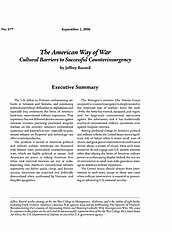The problem is rooted in American political and military culture. Americans are frustrated with limited wars, particularly counterinsurgent wars, which are highly political in nature. And Americans are averse to risking American lives when vital national interests are not at stake. Expecting that America’s conventional military superiority can deliver quick, cheap, and decisive success, Americans are surprised and politically demoralized when confronted by Vietnam- and Iraq-like quagmires.
The Pentagon’s aversion (the Marine Corps excepted) to counterinsurgency is deeply rooted in the American way of warfare. Since the early 1940s, the Army has trained, equipped, and organized for large-scale conventional operations against like adversaries, and it has traditionally employed conventional military operations even against irregular enemies.
Barring profound change in America’s political and military culture, the United States runs a significant risk of failure when it enters small wars of choice, and great power intervention in small wars is almost always a matter of choice. Most such wars, moreover, do not engage core U.S. security interests other than placing the limits of American military power on embarrassing display. Indeed, the very act of intervention in small wars risks gratuitous damage to America’s military reputation.
The United States should abstain from intervention in such wars, except in those rare cases when military intervention is essential to protecting or advancing U.S. national security.

